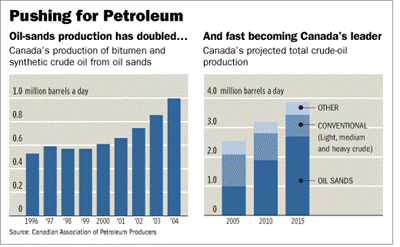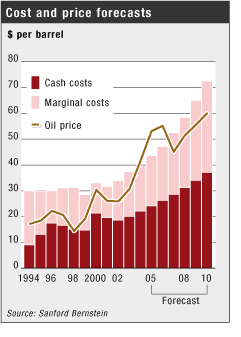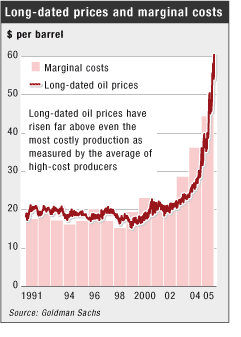Untitled Document
Total May Use Atomic Power At Oil-Sand Project
French oil giant Total SA, amid rising oil and natural-gas prices,
is considering building a nuclear power plant to extract ultraheavy oil from
the vast oil-sand fields of western Canada.
This comes as oil prices -- driven even higher by Hurricane Katrina and now
the threat of Hurricane Rita -- are removing lingering doubts about the long-term
profitability of extracting the molasseslike form of oil from sand, despite
the fact that the output is much more expensive to produce and to upgrade than
is conventional crude.
At the same time, prices of natural gas -- which oil-sands producers have relied
on to produce the steam and electricity needed to push the viscous oil out of
the ground -- have risen 45% in the past year. That is prompting Total, which
holds permits on large fields in Alberta that contain oil sands, to consider
building its own nuclear plant and using the energy produced to get the job
done.
This is interesting for two things: the global comeback of nuclear energy,
and the staggering investments required to develop the Canadian oil sands. Neither
are a sign that we are about to get back to an era of cheap energy...
Total's interest is the latest sign that nuclear energy is making a global comeback.
Finland commissioned a new reactor in 2003, the first such order in Western
Europe in 13 years. France has chosen a site in Normandy where a reactor will
be built. The U.S. hasn't commissioned a new nuclear plant for three decades,
but the industry is talking seriously about a revival, encouraged by the Bush
administration and the rising cost of fossil fuel.
(...)
Total is relying on Areva SA, the French state-run nuclear engineering company,
to define what type of reactor might suit its needs in Canada. Research is focusing
on a dedicated reactor significantly smaller than those used by utility companies
to produce electricity for large city grids.
Areva said discussions with Total are centering on a new type of reactor, known
as a High Temperature Reactor, with a capacity of around 500 megawatts, about
a third of the size of a traditional reactor. Areva also has been approached
by other oil companies but discussions are most advanced with Total, Jean-Jacques
Gautrot, Areva's director for international operations and marketing, said.
Areva, the French builder of nuclear plants (and the main contractor for the
new Finnish plant), has recently signed
an agreement with Constellation energy to prepare the ground to build new
nuclear reactors in the US. It is also bidding for new nuclear tranches in China.
I wrote most of what I know about nuclear energy in this diary: Nuclear
energy in France - a Sunday special, which describes how the industry is
run in France, how waste is stored (and how it will be stored for the long run),
and how costs are accounted for. I am certainly not trying to sell nuclear as
a cure all on the energy front, but it is certainly better than coal for baseload
(still the main source of electricity in the US, UK and Germany) and it is mostly
carbon-free and, when well-run like in France, very cheap. Against that, you
have the (manageable) problem of storing dangerous waste for long periods of
time, the (small but uninsurable) risk of a major accident, and the high upfront
cost (in money and energy) of the initial investment. On balance, nuclear should
remain part of our energy supply - but just a part, and mostly as a preference
to coal-fired plants.
But back to the oil sands:
In Canada, Total holds half of an oil-sands permit in Alberta and has secured
more heavy-oil acreage with the purchase of Deer Creek Energy Ltd., located
in the same western province. Total said it plans to invest $7 billion in Deer
Creek, on top of the $1.4 billion it expects to pay for the company. The company
says it could one day produce 200,000 barrels of heavy crude a day, close to
8% of Total's current global output.
Canada 's oil sands contain 174 billion barrels of recoverable reserves, the
world's second-largest oil resource behind those of Saudi Arabia, according
to Canadian government estimates.

Oil sands, a mixture of grit and a tarlike grade of crude oil known as bitumen,
were discovered more than a century ago but have been considered economical to
produce only in recent years as the price of oil has surged. In addition to nuclear
power, producers are considering burning oil-sands residue and coal as alternatives
to natural gas to make the steam needed for extraction.
Mr. Darricarrère said a nuclear power plant would help Total comply
with tougher constraints on carbon dioxide and other so-called greenhouse-gas
emissions. Although they generate toxic, radioactive waste, nuclear reactors
don't emit greenhouse gases that scientists believe contribute to global warming.
Hidden behind these paragraphs are two things:
* getting oil sands into something usable is a very messy process, which
requires a lot of industrial treatment of the oil sands, and a lot of energy.
So you need oil sands AND natural gas or some other power source to make oil,
which, as energy prices increase, will make the resulting oil quite expensive...
* as the numbers above show, this is an amazingly expensive effort. Consider
that Total says it will spend about 8 billion $ to build a 200,000 b/d capacity
- worth about 2 billion dollars per year at current prices, but equivalent
to 1% of US daily consumption - and imagine how much more will need to be
spent to get to volumes able to service America's insatiable thirst for oil...
The graph also shows that oil sand production in Canada is not expected to
reach significant volumes in the next 10-15 years, reaching barely 3-4% of
world production (and less than a third of current US imports), so it will
not be enough on its own to significantly modify the global oil balance. It
will certainly create few more fortunes in Alberta, and lots of prosperity
around Calgary, but it won't solve the looming oil crisis.
A spokesman for Imperial Oil Ltd. of Canada, an affiliate of Exxon Mobil Corp.,
which operates some of the world's largest oil-sands operations, said it looked
into the nuclear option in the past but didn't pursue it because of cost and
technology challenges.
Shell Canada Ltd. said it isn't considering nuclear power as part of its oil-sands
plans. Rather, the company said it is looking into the possibility of turning
asphaltene, very heavy oil, into gas to save on its natural-gas bill.
So there is still abundant skepticism in the industry. Most of all, this shows
the desperation of the industry in the face of dwindling reserves, lack of access
to the countries that still have some oil, and the increasing cost of production
of new volumes of oil.
Those that say that oil will come back to 40$/barrel or less are either lying
to us, hopelessly naive, or unaware of these worrying trends. The Financial
Times published an article (Storm
over the oil industry (behing sub wall) that came out just during Katrina
and which I did not find an opportunity to comment upon then)
The issue of costs might not get much attention as hurricanes, terrorist threats
to oil production, the dwindling spare capacity of oil in Saudi Arabia and the
insatiable thirst for energy in China and the US. But cost inflation is being
viewed as a significant reason why oil prices are so high and a sign that they
will remain so for some years to come. Sanford Bernstein expects the
cost of producing a single barrel of oil to increase by 9 per cent a year, from
about $22 a barrel this year to $36 in 2010, and the cost of finding
and producing the so-called marginal barrel - beyond which the activity becomes
unprofitable - will double to $60 over the same period. Uncertainty about how
much new projects will cost also prompted Goldman Sachs this month to raise
its prediction of the long-term oil price from $45 a barrel to $60.



